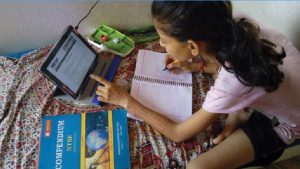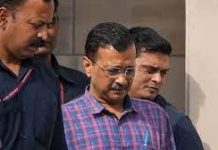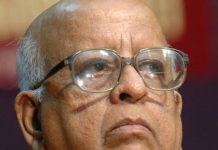 It’s a day of online teaching, a big moment and a big hit of all times. Online learning and educational technology are facing the biggest test — the biggest opportunity in its existence. While ‘Stay at home’ is the mantra of the day, this challenge opens a new opportunity for young and old faculties. From pre-schoolers to doctoral candidates, all are suddenly forced to stay home due to the coronavirus pandemic. The Covid-19 pandemic has forced from kinder garden — 12th standard schools and universities to close and send students home.
It’s a day of online teaching, a big moment and a big hit of all times. Online learning and educational technology are facing the biggest test — the biggest opportunity in its existence. While ‘Stay at home’ is the mantra of the day, this challenge opens a new opportunity for young and old faculties. From pre-schoolers to doctoral candidates, all are suddenly forced to stay home due to the coronavirus pandemic. The Covid-19 pandemic has forced from kinder garden — 12th standard schools and universities to close and send students home.
On March 16, the Union Government declared a countrywide lock-down of schools and colleges. On March 18, CBSE released revised guidelines for examination centres. On 19th March, CBSE and JEE main examinations were postponed till March 31, 2020.On March 20, Maharashtra government cancelled examinations. While Madhya Pradesh Board of Secondary Education postponed board examinations. Kerala government postponed its Board examinations of class 10th and 12th. Assam government cancelled all exams till March 31. The Union Public Service Commission also postponed the interview for the Civil Services Examination 2019. The SSC exams in Tamil Nadu and Pondicherry (now Puduchery) were also postponed. The impact was so great on education.
Globally, over 1.2 billion children are out of the classroom. While countries are at different points in their Covid-19 infection rates worldwide. There are currently more than 1.2 billion children in 186 countries affected by school closures due to the pandemic. In Denmark, children up to the age of 11 are returning to nurseries and schools after initially closing on 12th March, but in South Korea students are responding to roll calls from their teachers online. In India, in haste, without discussing the modalities and possible problems, teachers in the Universities were asked to start online classes by MHRD/UGC during this lockdown. The University Grant Commission (UGC) said students and teachers to utilise this time productively by engaging in online learning.
The lockdown for the Covid 19 pandemic has ushered into a new life and ushered in the city wise classroom: tens and thousands of students are gloomed in computers, laptops and smart phones screens. The present pandemic has forced for online learning plans and technology for students and faculty to work from home, breaking all social constraints of classroom learning which has met with good responses from students and parents as well.
As it was mid semester, a portion of the syllabus could be completed .Through online classes the faculties are making efforts to complete the syllabus. This would help students as well. Once the educational institutions reopen, it will help in conducting the examination while maintaining the flow of study for students. In addition, students are engaged in studies, assignments, projects as well. Most faculty members feel that knowledge cannot come to a halt, no matter what.
Video conferencing platforms such as Zoom, Google Meet and WebEx are being used heavily as learning management — a challenge that Covid-19 has thrown to the teachers and students over technology and access as well. Screenshots of live online classes through lectures and webinars have been flooded through internet aided technology resulting in seamless transition from offline to online classes, at a time when it is required the most. Uploading lectures through you tube and Face book live are fashions of the day. Andhra Pradesh and West Bengal have also tapped TV Channels to access barriers and reach the students. In addition, there is enabling software such as Proctorio, a Google Chrome extension that monitors students taking exams online. Students and faculty remain busy. Students are informed through email or WhatsApp about the time and topic of the online classes.
It is a fact, that most education institutions are not equipped to connect with students and conduct on-line classes. Yet, given the present situation; many educational institutions have started leveraging meeting platforms and applications having video conferencing facilities to run online classes. No matter what , the idea of online teaching has got a boost and has already been successfully implemented in the educational institutions across the country. However, this mechanism is largely being adopted in urban areas and limited to institutions catering to affluent sections of society.
But, do the students of rural India have access to the technology?
There are several ICT initiatives of the MHRD, UGC and its Inter-University Centres (IUCs) – Information and Library Network (INFLIBNET) and Consortium for Educational Communication (CEC), in the form of digital platforms. These digital platforms can be accessed by the teachers, students, and researchers in Universities and Colleges for learning. The Ministry of Human Resource Development has recently launched three initiatives — Swayam, Swayam Prabha, and National Academic Depository, which aim to take the e-learning sector in India.
Swayam and Swayam Prabha are a rendition of digital classrooms that enable students from rural areas to connect either through the Internet or direct-to-home service and access educational content. Swayam Prabha aims to tap into the potential utilization of Direct-to-Home (DTH) Service, and plans are already in place for setting up of a dish antenna that would give students access to educational channels run by the HRD ministry. Yet, rural India needs a greater boost and investment in this section.
Constraints and struggles:
For holding online classes, the teacher as well as participating students need internet connectivity at their homes. The quality of internet connectivity in terms of broadband/ Wi-Fi is important in case of Zoom, Google Meet, Watts app and video conferencing facilities. With students returning to their villages, many of them do not have high bandwidth or strong internet connection that online courses require. Added to this, is the prolonged interruption in internet supply due to severe damages in the server system and transmission towers in the locations of teachers and students creating a problem in online teaching. All the students in the class are not able to join and not all teachers are able to conduct online classes because of their locations which are on the campus, city, or stranded out of the city. While some teachers are even not ready for this kind of shift of teaching.
To access online classes, both teachers and students need to have devices like laptops/ desktops, smart phones or tablets. Access to devices, especially for children is dependent on the economic status of their families and therefore hinders online classes.
Teachers conducting on-line classes need to have the requisite training as it goes beyond replicating classroom teaching. In the classroom, the teacher has visibility of all students and through their body language can assess their level of concentration and understanding, which enables course correction during lesson delivery itself. While in conducting classes online, such visibility is not there. While the leisure of this concept sounds nice, it takes away from the interpersonal skills that students need to acquire along with their education. For Science students it may not help where lab test is required.
The last few words:
Whatever the constraints may be, Covet 19 has brought to us, online learning and teaching has been an exciting journey. One cannot rule out the fact that it has opened the door for great opportunities for future. While some believe that the unplanned and rapid move to online learning will result in a poor user experience that is unconducive, others believe that a new hybrid model of education will emerge, with significant benefits. I believe that this sudden integration of information technology with education will be accelerated and that online education will eventually become an integral component of education in India in future days to come.
The author is an Associate Professor & Dean of Faculty in National University of Study & Research in Law. Views expressed are her own
letters@tehelka.com












